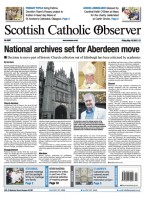BY Martin Dunlop | March 7 | ![]() 0 COMMENTS
0 COMMENTS ![]() print
print

‘Our own traditions and beliefs are not full, final and complete’
Professor Catherine Cornille, a leading Catholic thinker on inter-religious dialogue, opens this year’s Gonzaga Lectures at St Aloysius College
The 2012 series of St Aloysius Gonzaga Lectures began last night with Professor Catherine Cornille welcomed to Glasgow’s Jesuit college to give the first talk.
This year’s lectures, focused on exploring Christian life, are based on inter-religious dialogue, and the series began with Professor Cornille (above) speaking about the possibilities and limits of dialogue between faiths.
Welcoming Ms Cornille to St Aloysius, John Stoer, St Aloysius headmaster, noted that Professor John Grant of Glasgow University had described her as ‘the leading Catholic thinker in the world in relation to inter-religious dialogue.’
In beginning her lecture, Ms Cornille—associate professor of comparative theology and chair of the department of theology at Boston College, Boston’s Jesuit university—noted that the possibilities of inter-religious dialogue surround us as ‘we are constantly confronted with people of other religions all through life,’ a reality, she said, that ‘can be very threatening for people of faith.’
Ms Cornille argued, however, that inter-religious dialogue is not just about opening up discussions but has the two goals of mutual understanding and possibilities of growth.
In terms of mutual understanding, she noted that for dialogue to be possible we must try to understand the beliefs of other religions and to try to ‘enter into their world view.’ She also challenged those gathered to think ‘how we would explain our own Catholic Faith’ to somebody of another religion.
Professor Cornille added that empathy for other religions is possible but ‘we must understand the meaning’ of other faiths and ‘and be sympathetic towards them’ for this atmosphere to be created.
The second part of the lecture focused on the possibilities of growth through inter-religious dialogue.
“When we look at the history of our traditions, we realise that every religion is changing,” Ms Cornille said, before adding that ‘unconscious dialogue’ is taking place between religions all the time.
“Growth requires knowledge that our own traditions and beliefs are not full, final and complete,” she added.
She said that recognising truths in other religions helps us to understand that we do not have the fullness of truth in our own tradition.
“In a Catholic tradition, we find this, post Second Vatican Council, through the document Nostra Aetate,” she said. “This should propel us, as Christians, to go out and search for those rays of God’s truth.”
Ms Cornille concluded that those engaging in inter-religious dialogue ‘must come back and make the fruits of dialogue available to the traditions as a whole’ but warned, however, that this can cause a ‘two-way street, as some traditions are not receptive to dialogue, viewing it as controversial and dangerous.’
On the next three Tuesday evenings, further discussions on inter-religious dialogue will be given by Fr Michael Barnes SJ, reader and senior tutor in inter-religious relations, Heythrop College, London, Rabbi James Baaden, Oxford University, and Professor Hugh Goddard, director of the Prince Alwaleed Bin Talal Centre for the study of Islam in the contemporary world at Edinburgh University.
—All talks begin at St Aloysius College at 7.30pm. The lectures are being recorded and will be available from Anne Grogan, senior school receptionist who can be contacted by telephone at: 0141 332 3190 or by email at: [email protected].











